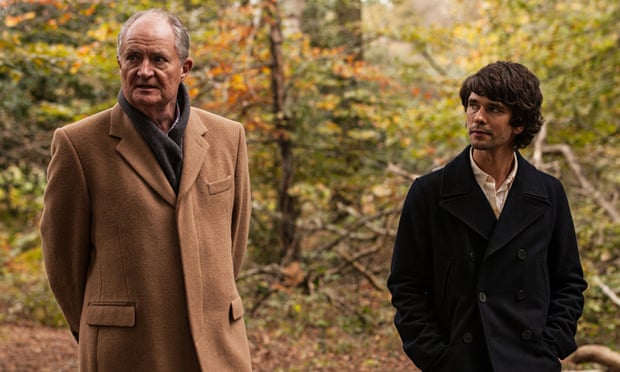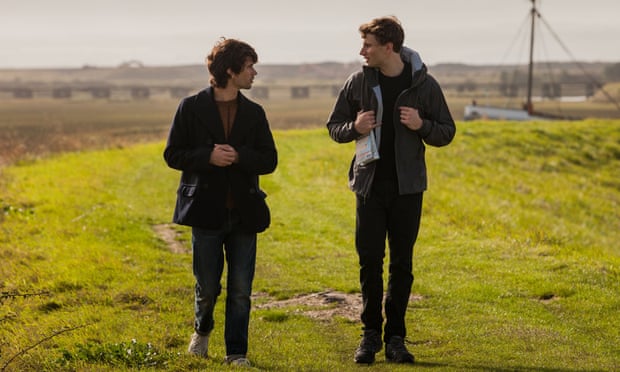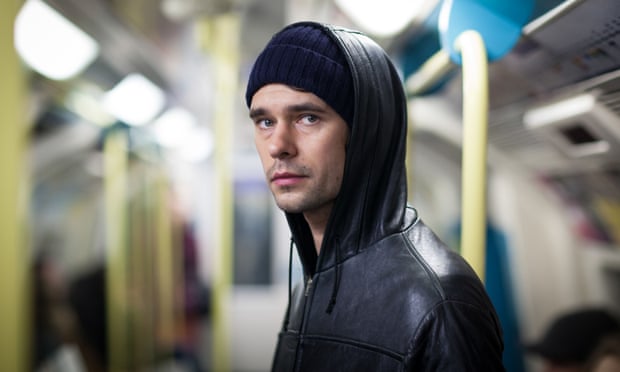http://www.theguardian.com/tv-and-radio/2015/nov/09/london-spy-ben-whishaw-jim-broadbentTELEVISIONBen Whishaw and Jim Broadbent onLondon Spy‘It’s not a gay story. It’s about
guys who happen to be gay’Part romance, part chilly thriller, the new BBC espionage drama is
taking the genre into bold new territory. We go on set with its starsBy Huw Oliver
9 November 2015 Jim Broadbent and Ben Whishaw in London Spy. Photograph: Joss Barratt/BBC/WTTV Limited
Jim Broadbent and Ben Whishaw in London Spy. Photograph: Joss Barratt/BBC/WTTV LimitedBraving the wintry weather, the
London Spy crew have set up camp in a deserted box building off a side street, south of the river in
Kennington. Supermarket bags snagged in dead trees, sirens wailing in the distance, the clanging of corrugated iron: the scene overflows with just the kind of iconography you might associate with a traditional British spy drama.
But never trust appearances, is what I’m told.
Ben Whishaw, who is currently juggling shooting this five-part
BBC2 series with his role as
Q in
Spectre, has just come off set and is adamant that this is the least spy thriller spy thriller you can imagine, a far cry from Bond.
“It doesn’t really feel like a spy thriller to me, although it sort of is,” he says, distractedly cradling a hot-water bottle. “It’s broader than that, because it’s about a character who’s not within that world, about somebody who stumbles into it and to whom it’s alien and mystifying. So it doesn’t feel like a traditional spy drama in that sense. It’s more about his mind.”
Whishaw clasps the puzzles page of this morning’s Metro under his arm, bearing traces of fatigue and a ruffled
Ian Brown haircut. “This has been very full-on,” he says of filming the series. “I don’t think I’ve ever done anything as intense and demanding as this.” In what has effectively become a character piece for Whishaw,
London Spy’s early starts and heart-rending monologues have clearly taken their toll.
Subtler and more romantic than your usual spook fare, the plot spirals out of a gay love story – surely the first such intrigue in a mainstream TV spy drama – and is propelled by Whishaw’s perpetually downtrodden
Danny. Working in a stock room by day and frequenting
Vauxhall’s clubs by night, Danny is, says Whishaw, a bit lost. But everything changes when he bumps into the beneficent, enigmatic
Alex (
Edward Holcroft) on
Lambeth Bridge in the early hours after a night out. The two characters are vastly different: Alex is an awkward and eloquent maths genius; Danny is, despite his circumstances, cheeky, charming and boyish. But they click and a relationship blossoms. All this time, Danny believes Alex to be an investment banker, but he is in fact a gifted
MI6 spy. And when the latter suddenly disappears and the police start asking difficult questions, Danny gets sucked into the shadowy, subversive, terrifying world of espionage.
Today’s scene involves Danny trying to crack a code left behind by his partner. The deserted building is one of Danny’s old hangouts, somewhere he hopes won’t be bugged or watched, and he’s invited three aides along: closest friend
Scottie (
Jim Broadbent), Alex’s former maths teacher
Marcus (
Adrian Lester) and Scottie’s university companion
Claire (
Harriet Walter). All four characters are very real and recognisable human beings, worlds away from your typical trope-riddled spooks-in-suits, chasing each other over the tops of buildings, and they’re all the more appealing for it.
 Spooks: Ben Whishaw and Edward Holcroft in London Spy. Photograph: Joss Barratt/BBC/WTTV Limited
Spooks: Ben Whishaw and Edward Holcroft in London Spy. Photograph: Joss Barratt/BBC/WTTV LimitedWalter, who is currently doing just what you might expect her to do to relax away from the camera – drinking tea – was drawn to the drama because of the relatability of the individuals in
Tom Rob Smith’s script (the first the
Child 44 author has written for television). “This isn’t just a spy thriller,” she says. “It focuses more on the characters and their exclusion from certain normal areas of life because of their personalities, rather than because they’re spies or not spies. The characters are more unpredictable, more unusual.”
Smith, for his part, explains that the encounters between Danny and these various characters provide the motor for the plot as he tries to unpick the enigma of Alex’s life. Intimacy, and whether you can trust even those closest to you, is a major theme throughout.
“Danny’s journey is essentially one of meeting people who are extraordinary in some particular way,” he says. “He’s trying to decode what part these people play in the conspiracy, if there is one. People are very ambiguous and Ben as Danny is looking to figure out what roles these people play. It’s basically a thriller that explores the uncertainty of people, not the uncertainty of institutions.”
Feeding off this ambiguity, the direction of
Jakob Verbruggen (
The Fall, The Bridge) conveys a constant sense of paranoia through long, languid shots, uncomfortable silences and suggestive camerawork. Grey, hodgepodge cityscapes reinforce this sense of unease: London is a city that’s constantly in flux, a collision of old and new. Most scenes are filmed in the half-light or dark, painting a remarkably eerie portrait of the capital, one that’s heaps more believable than, say,
Sherlock’s fetishised depiction of “modern London”.
 Eye Spy: Ben Whishaw Photograph: Ed Miller/BBC/WTTV Limited
Eye Spy: Ben Whishaw Photograph: Ed Miller/BBC/WTTV Limited“It’s all about observing everyday activity in naturalistic situations,” says Lester, whose cold-yet-suave maths professor eventually manages to crack the code. “That’s what espionage is: gleaning very important information from almost nothing, and that’s what the script does. It invites you to look at the way someone’s blinking or the way they move their hand; that’s how you’re supposed to get your information and follow the plot.”
After Alex vanishes, the main relationship we follow is between Danny and Scottie, Jim Broadbent’s character. An elderly, wise but wounded figure, Scottie used to work in the secret services, and acts as a kind of mentor to Danny. For writer Smith, Scottie represents someone he never had growing up: “I really envied people who had that figure,” he says. “So this is my version.”
There are also hints of unrequited love between the pair, an original set-up for the typically macho world of the spy thriller. But although these gay relationships are at the heart of it, Broadbent stresses “it’s not a gay story” as he stares me down with his quizzical blue eyes. “It’s not about that. It’s about these particular guys, who happen to be gay, who are in the midst of this maelstrom of an unfolding tale.”
Speaking to Smith, it transpires that much of
London Spy was written and rewritten with Whishaw in mind, making Danny his perfect suit. Whishaw was sent an early draft of the script a long time before shooting, and immediately jumped on it. Smith knew that the actor was playing the role when finishing up the final scripts, with the result that “he’s very much in the DNA of the character”. The actor has always managed to strike a careful balance between film (most recently
Spectre,
The Lobster and
Suffragette), theatre (starting out with
Hamlet at the
Old Vic) and TV (
Criminal Justice,
The Hour), but never has a specific part been so thoughtfully tailored to his qualities: sweet yet melancholy, and always slightly mysterious. All this fuss, and it turns out he isn’t even much of a spy drama fan. “Although I might seem to be in a lot of spy things, I don’t actually watch them,” he admits.
Still, what Whishaw lacks in espionage smarts, he makes up for in creating intriguing, empathetic characters. “He’s totally truthful,” says his co-star Walter. “You don’t quite know when he’s practising and when he’s just thinking and when he’s acting. And I constantly, still, need to learn from people like that. We always need to do a check on ourselves about truthfulness because every acting generation has a different conception of it.”
Likewise, every generation has a different concept of the spy drama and this series feels like the most contemporary version to date. You might not be able to trust appearances, but you can bank on there being more than meets the eye.
London Spy starts Monday 9 November, 9pm, BBC2